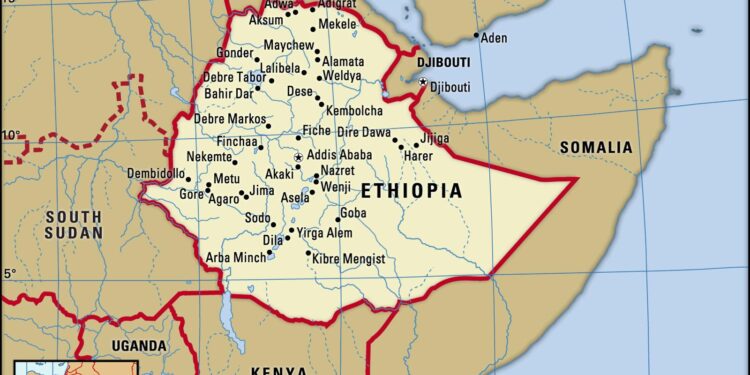Title: Ethiopia’s Ambition for Eritrea’s Assab Port: A Brewing Geopolitical Crisis
In the intricate geopolitical arena of the Horn of Africa, Ethiopia’s pursuit of access to Eritrea’s strategically positioned Assab Port has resurfaced as a potential catalyst for renewed regional instability. Since Eritrea gained independence in 1993, Assab Port has symbolized its sovereignty and economic autonomy. Yet, with Ethiopia’s rapid economic growth and increasing need for maritime outlets, this sensitive issue remains a latent source of tension. Experts caution that Ethiopia’s revived interest in Assab could have profound consequences not only on bilateral ties but also on the broader security dynamics across the Horn of Africa. This article delves into the historical background, recent developments, and delicate power equilibrium surrounding Ethiopia’s port ambitions—an issue that could ignite significant geopolitical upheaval.
Ethiopia’s Maritime Strategy: The Critical Importance of Assab Port
For landlocked Ethiopia, securing reliable access to seaports is vital for sustaining its expanding economy and enhancing trade connectivity. Among available options along the Red Sea coast, Eritrea’s Assab Port stands out as a highly coveted gateway due to its strategic location and existing infrastructure. Gaining operational control or preferential usage rights over this port could unlock substantial economic benefits by lowering transportation costs and boosting export-import efficiency.
Beyond pure economics, control over Assab carries significant strategic weight in shaping regional influence within East Africa. It would enable Ethiopia to assert itself more prominently in maritime logistics corridors linking Africa with Middle Eastern and Asian markets—a factor increasingly important given global trade shifts observed since 2020.
However, these ambitions are entangled with complex issues:
- Heightened Security Risks: Competition over port control risks escalating military tensions between Ethiopian and Eritrean forces.
- External Power Involvement: Regional actors such as Gulf states may deepen their engagement to protect their interests through alliances or investments.
- Humanitarian Ramifications: Disputes affecting port operations can disrupt humanitarian aid flows critical to vulnerable populations across both countries.
The intersection of these factors creates an environment ripe for conflict if diplomatic channels fail to manage competing claims effectively.
Regional Repercussions Amidst Horn of Africa’s Fragile Equilibrium
Ethiopia’s drive toward securing maritime access via Assab is part of a broader vision aimed at integrating regional economies while reducing dependency on neighboring Djibouti—the current primary outlet handling about 95% of Ethiopian imports (World Bank data 2023). While this diversification strategy promises logistical advantages for Addis Ababa, it simultaneously raises alarms regarding Eritrean sovereignty concerns.
The fragile peace established after years-long hostilities between these neighbors remains susceptible to disruption should either side perceive moves toward port control as encroachment or aggression. Historical grievances rooted in border conflicts continue influencing public sentiment on both sides.
Moreover, shifting alliances among neighboring states like Sudan—also vying for influence along Red Sea corridors—and Djibouti complicate matters further by introducing competitive dynamics into an already volatile region.
Key challenges include:
- Bilateral Trust Deficit: Lingering mistrust hampers cooperative frameworks necessary for joint management or shared use agreements.
- Eritrea’s Political Stability: The government relies heavily on maintaining territorial integrity; any perceived loss threatens internal cohesion.
- The Role of External Powers: Increased involvement from Middle Eastern countries seeking footholds intensifies geopolitical complexity around Red Sea ports.
Given these intertwined factors, sustainable peace requires multilateral dialogue emphasizing mutual respect alongside pragmatic economic collaboration among all stakeholders within the Horn region.
Charting a Path Forward: Diplomatic Solutions Amidst Port Access Disputes
Navigating tensions surrounding Assab demands prioritizing diplomacy over confrontation—a principle essential if lasting stability is desired amid competing national interests. Constructive engagement strategies should focus on building trust through transparent communication channels between Ethiopian and Eritrean authorities while involving regional partners who share stakes in peaceful outcomes.
Recommended approaches include:
- Create Regular Bilateral Forums: Institutionalize meetings dedicated exclusively to resolving disputes related to port usage rights and infrastructure development plans.
- Pursue Regional Integration Initiatives: Encourage participation from neighboring countries such as Djibouti and Sudan in cooperative projects fostering shared prosperity rather than rivalry.
- Pilot Joint Economic Ventures: Launch collaborative enterprises focused on upgrading transport networks linking inland production centers with coastal ports—thereby generating interdependence that discourages conflict escalation.
International organizations like the African Union (AU) alongside United Nations agencies must play active roles by mediating negotiations consistent with international maritime law frameworks established under UNCLOS (United Nations Convention on Law of the Sea).
| Diplomatic Action | Description |
|---|---|
| Mediation & Monitoring Missions | African Union-led observer teams ensuring compliance with agreed terms governing port operations; |
| Sustainable Development Funding | Sponsoring cross-border initiatives promoting social cohesion plus infrastructural improvements benefiting local communities; |
By adopting balanced policies emphasizing cooperation rather than competition over strategic assets like Assab Port, both nations can mitigate risks associated with territorial disputes while unlocking new avenues toward shared growth prospects within East Africa’s evolving landscape.
Conclusion: Anticipating Future Challenges Over Maritime Access in the Horn Region
To summarize, Ethiopia’s persistent efforts aimed at gaining foothold at Eritrea’s crucial Red Sea gateway encapsulate multifaceted challenges blending historical animosities with contemporary economic imperatives. As Addis Ababa seeks alternatives beyond Djibouti amid rising import-export volumes projected at annual growth rates exceeding 8% (IMF report 2024), managing relations around Assab becomes ever more critical—not only bilaterally but also regionally given interconnected security concerns spanning multiple borders.
Failure to address underlying political sensitivities risks reigniting old conflicts detrimental not just locally but potentially destabilizing wider parts of East Africa where fragile governance structures prevail post-conflict recovery phases following recent crises including Tigray war aftermaths (UNDP analysis 2024).
Global observers remain vigilant as developments unfold; how stakeholders navigate this precarious juncture will significantly shape future trajectories concerning trade routes accessibility versus sovereign rights protection throughout one of Africa’s most geopolitically sensitive zones.
EritreaLive will continue providing timely updates analyzing emerging trends tied directly or indirectly to what many experts now regard as one East African hotspot capable—if mishandled—of triggering broader confrontations akin to other global flashpoints documented recently. Learn more about similar geopolitical flashpoints here..















